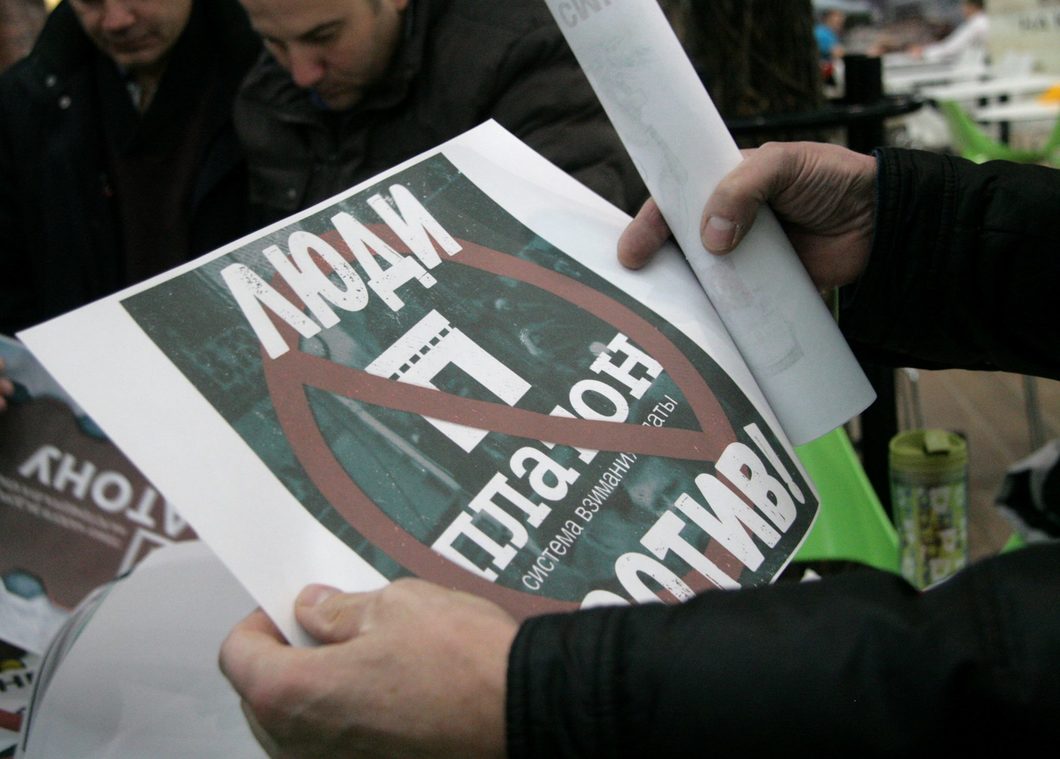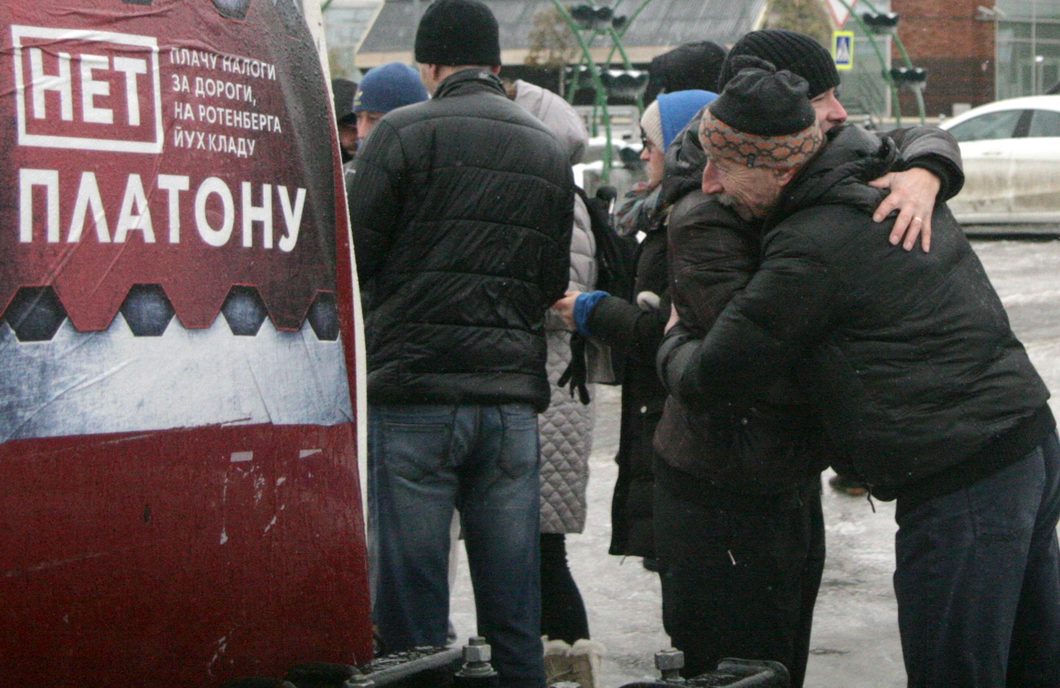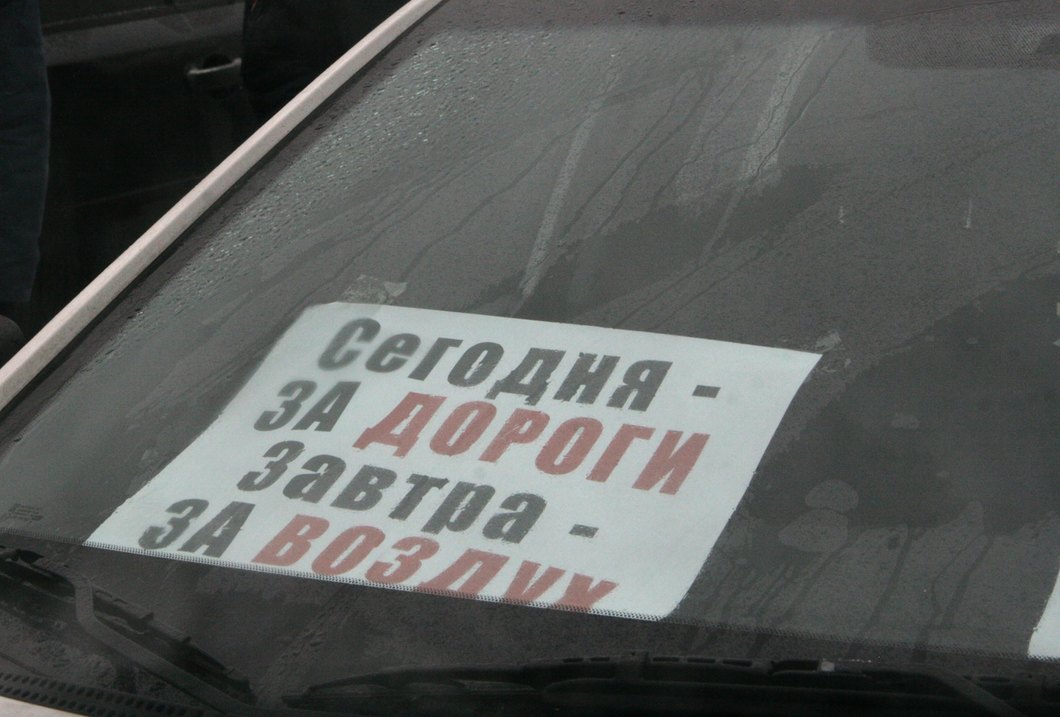Protesting Truckers Make Political Demands
On Anniversary of Anti-Plato Protests, Police Were Lying in Wait for Activists at Famous Parking Lot in Khimki and Quickly Detained Them; Ambulance Summoned to Courtroom
Dmitry Rebrov
Novaya Gazeta
November 12, 2016
The problems with the “anniversary”—it was exactly a year ago, on November 11, 2015, that Russian truckers kicked off their protest against the newly introduced Plato road tolls system—started long before the D-Day designated by the Association of Russian Carriers (OPR). On November 9, it transpired that the Khimki mayor’s office would not permit them to gather at their old spot under the MEGA sign, the place where trucks had stood parked for nearly six months.
The truckers responded by decided to replace the rally with a series of solo pickets, but problems arose in this case as well. First, the truckers, who had been going to the parking lot and checking it out over the course of the year, were not admitted to the site of their former camp. Arriving twenty-four hours before the start of the pickets, Mikhail Kurbatov, one of the movement’s leaders, discovered signs saying, “Truck traffic prohibited,” and a police squad who forcibly removed him from the parking lot. A video showing the police twisting his arms has already been posted on the web. And on the morning of the eleventh, it was discovered that maintenance services had managed to pile the spot itself with snow, given that the weather was forthcoming.
However, a genuinely cold reception lay in store for the activists.

“There will be protest rallies today in twenty-two regions, so there aren’t so many people here. All the activists have gone to their home regions to rock the boat. But Muscovites have bitten the bullet and installed Plato, because it costs to protest, and we are not a united group,” said activist Igor Melnikov, standing next to a blue truck emblazoned with the OPR logo.
He was trying to explain why no more than a dozen people had assembled for the rally.
Melnikov is a Muscovite himself, just like the five regular volunteers who have been helping the Khimki protesters since last winter.
“Not everyone would choose to travel to Khimki in this weather,” Melnikov continued. “That is partly why, in place of the banned rally, it was decided to hold a big rally on Suvorov Square in Moscow on November 12, and restrict ourselves to a small detachment here in Khimki.”
The rally in Moscow has been supported by the Communists.
“What of it? I know who the Communists are, that they destroyed my country. I grew up under them. But that is okay. They can hold the microphone. We’ll live through it!” Yekaterina Bolotova, a perky brunette, put in her five kopecks.
Bolotova, a private entrepreneur, lives in Lyubertsy. She has been in business since the 1990s.
While we were chatting, a grader kept shoveling dirty snow towards the MEGA sign as freezing rain fell.
“There is already more than three of you. What are you doing here?”
A delegation from the Moscow Regional Criminal Investigative Department had arrived to test the waters. Two gloomy figures, both dressed in black, approached us, obviously reluctantly. The larger of the two men showed us his ID: “Oleg Nikolayevich Kuznetsov.” The second man did not show us his badge, but explained the reason for the visit.
“The bosses sent us.”
“Speaking frankly, we’re expecting certain people,” the cops said in a roundabout way. “The people who are going to protest Plato.”
“We are those people. What else do you want?” the truckers unceremoniously informed them.

The police then withdrew, asking us not to photograph their faces.
“I’m a secret agent. My face cannot be published!” said “Oleg Nikolayevich Kuznetsov” self-importantly.
“Well, if you’re so secret, why don’t you stay at home, since we can’t look at you?” a trucker retorted.
Meanwhile, a paddy wagon and reinforcements were pulling up at the impromptu checkpoint behind them.
“We now have political demands. In addition to abolishing the Plato system, we want transport minister Maxim Sokolov to resign, Prime Minister Medvedev to resign, and the repeal of Article 20.2 of the Russian Federal Administrative Offenses Code, which covers violations at political rallies, because it is insanity. People are no longer able to voice their opinions,” said Kurbatov.
According to the OPR’s official website, the truckers propose leaving only the fuel excise tax intact and scrapping the transport tax. They support judicial reform, including the recertification of all judges. And they want “all embezzlers to face criminal charges.”
Some of these demands are a natural response to the endless jail terms and arrests the once apolitical truckers have faced. Other demands have emerged in the aftermath of discussions with political activists who regularly visited the protest camp last winter.
Looking for the “Core” Activists
“Are they making arrests?”
“He raised flags on his trucks!”
We dashed through the snowdrifts to the other end of the parking lot, where a dozen cops were packing Sergei Einbinder, an activist with the Interregional Trade Union of Professional Drivers, into a car.
Led by Alexander Kotov, the Khimki protesters had managed to come to an agreement with police spokespeople about joint actions for the first time in a long time. Kotov had once led the resistance, but quickly surrendered, as the Khimki protesters explained, causing general annoyance among the striking truckers. Instead of blocking the Moscow Ring Road and driving a convoy into downtown Moscow, under Kotov’s leadership the protest had bogged down in attempts to slow down the “radicals” and in endless negotiations with federal MPs. Now, apparently, the irritation with Kotov had passed.
“The security forces had pressured Kotov back then,” explained Bolotova, a Kotov supporter.
She had come to Khimki to establish contacts, but unlike Eibinder, she had immediately gone over to her colleagues.
Bolotova had also been dragged in for interrogations by the Lyubertsy police and Center “E.”

Similar coercion had led to a break with the group of activists who had fought the Rotenbergs most fiercely, the Dagestanis. None of their members was present at Friday’s rally.
“At the moment, we have lost contact with Dagestan,” admitted Kurbatov. “All our work there was tied to Rustam Mallamagomedov, but after he was beaten up while we were waiting for the [Krasnodar] farmers in a camp near Rostov and then sentenced to administrative arrest in absentia, he was basically forced to give up the cause and go to ground. Currently, we are not even in contact with him.”
Kurbatov added that security forces coerced and terrorized the Dagestani truckers the most harshly.
“Are You Freezing?”
When, an hour later, the truckers emerged from the MEGA mall, where they had gone to get out harm’s way and discuss strategy, to take up their solo pickets, the police amassed in the parking lot reacted almost instantly.
The first to be sent to the precinct were Yekaterina Bolotova and Igor Melnikov. By midday, the security forces had managed to cram all the truckers, all their volunteer helpers from Khimki, and even the journalists, including a crew from TV Rain, into the paddy wagon.
“What we predicted last year has happened. As soon as [parliamentary] elections had taken place, the moratorium on raising rates was lifted. In fact, the government did not even keep its own promise of freezing prices until July 2017. So we decided there was no time to lose, and we have hit the streets, although we were not very well prepared,” said Kurbatov.
By six in the evening on Friday, all the detainees had been delivered to Police Precinct No. 1 in Khimki. But it proved difficult to find out what the truckers had been charged with.
In the morning, the truckers’ attorneys informed us that Sergei Einbinder, who had been detained first, had cut his hands and face to protest the police’s actions.
“After twenty hours at the precinct, they hadn’t even allowed me to see a lawyer or explain what I was being charged with, so I decided to take extreme measures,” Einbinder told Novaya Gazeta by phone.
Earlier, Einbinder had tried to leave the police station on his own after surrendering his internal passport, but police responded by detaining two lawyers that had been provided for him by the Anti-Corruption Foundation (FBK). The two lawyers, Vitaly Serukanov and Artyom Khemelevsky, have already been released. The journalists taken down to the precinct with the truckers were released the same day. No arrest reports were filed against them nor were they subjected to additional questioning.
By Saturday, it had transpired the truckers involved in the protest had been charged with disobeying the police (Article 19.3 of the Administrative Offenses Code) rather than for violating the rules of public rallies (Article 20.2).
Elena Filippova, press secretary for the truckers, who was detained along with them, related what conditions have been like for the activists at the police station. According to her, the female activists who have been helping the truckers and the truckers themselves slept in separate cells.
“In the women’s cells, the three of us were given one dry mattress, which we could sleep on, and two wet mattresses. We have now just thrown out the wet mattresses. Apparently, they had long been waiting their turn, and such an occasion had presented itself. Girls had shown up at the station: why not torment them a bit? In the morning, one of the cops gleefully asked, ‘Are you freezing?’ We have been allowed to use the toilet only twice in twenty hours, and we had to demand to be given food, which was brought only six hours later.”
Court hearings commenced only at two in the afternoon, and they looked likely to run until Saturday evening.
After numerous requests, Sergei Einbinder was transported from the courthouse by an ambulance crew.
Currently, truckers Mikhail Kurbatov, Vladimir Sinitsyn, Dmitry Lazar, and Igor Melnikov, their assistants Ivan Gushchin and OPR press secretary Elena Filippova, and activist Olga Reznikova, who also was involved in Friday’s protest, are still in police custody.
Translated by the Russian Reader
Discover more from The Russian Reader
Subscribe to get the latest posts to your email.